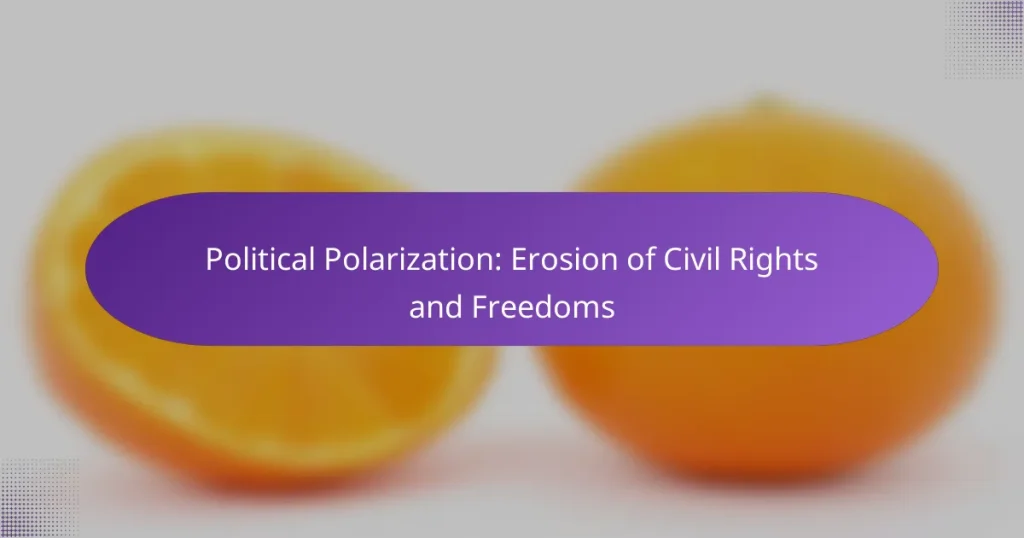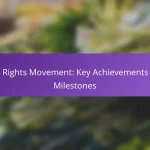Political polarization poses a significant threat to civil rights and freedoms, creating an environment ripe for discrimination and the suppression of free speech. As divisions deepen, the protections that uphold equality and liberty for all citizens are increasingly at risk. To combat this trend, fostering communication and collaboration within communities is essential, alongside active participation in civil rights advocacy.
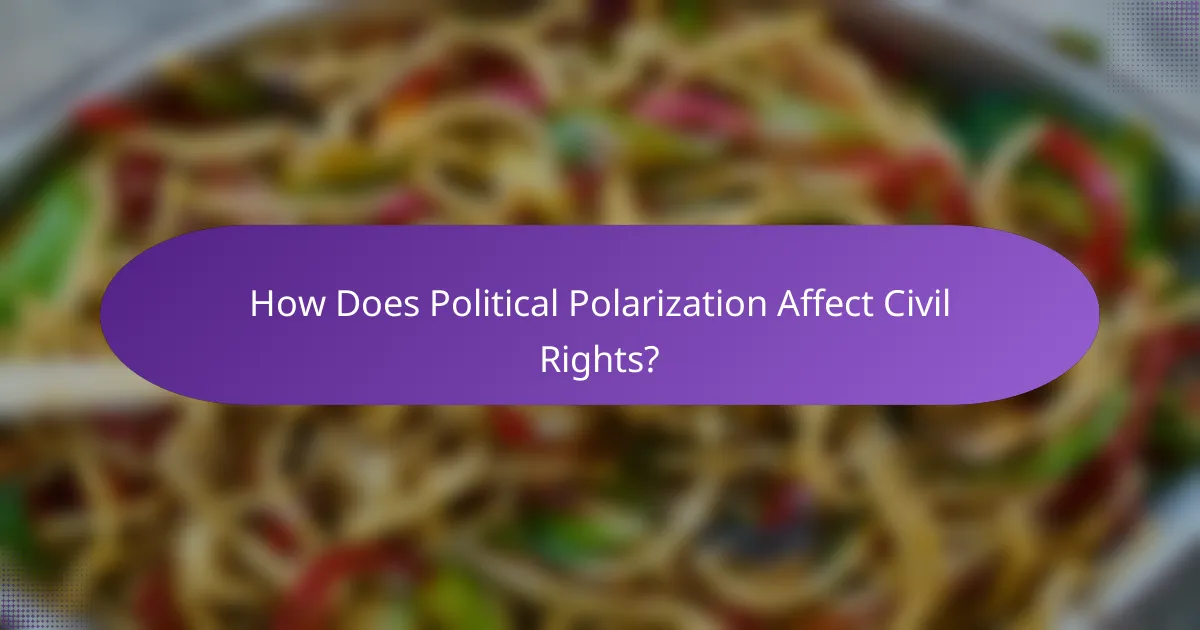
How Does Political Polarization Affect Civil Rights?
Political polarization significantly undermines civil rights by fostering an environment where discrimination, suppression of free speech, and challenges to voting rights become more prevalent. This division can lead to the erosion of protections that ensure equality and freedom for all citizens.
Increased discrimination
Political polarization often results in heightened discrimination against marginalized groups. As political factions become more entrenched, individuals may face bias based on their political affiliations, ethnicity, or social status.
For example, in some regions, laws and policies may be enacted that disproportionately affect minority communities, limiting their access to resources and opportunities. This can manifest in areas such as employment, housing, and education.
Suppression of free speech
Political polarization can lead to the suppression of free speech, particularly for those who express dissenting views. In highly polarized environments, individuals may fear backlash or social ostracism for speaking out, which stifles open dialogue and debate.
Additionally, some governments may implement regulations that restrict certain forms of expression, labeling them as harmful or extremist. This can create a chilling effect where people self-censor to avoid repercussions.
Impact on voting rights
Political polarization can adversely affect voting rights by leading to the introduction of restrictive voting laws. These laws may include voter ID requirements, purging of voter rolls, or limiting early voting, disproportionately impacting low-income and minority voters.
In the United States, for instance, various states have enacted legislation that critics argue makes it more difficult for certain populations to vote. This undermines the democratic process and can lead to unequal representation in government.
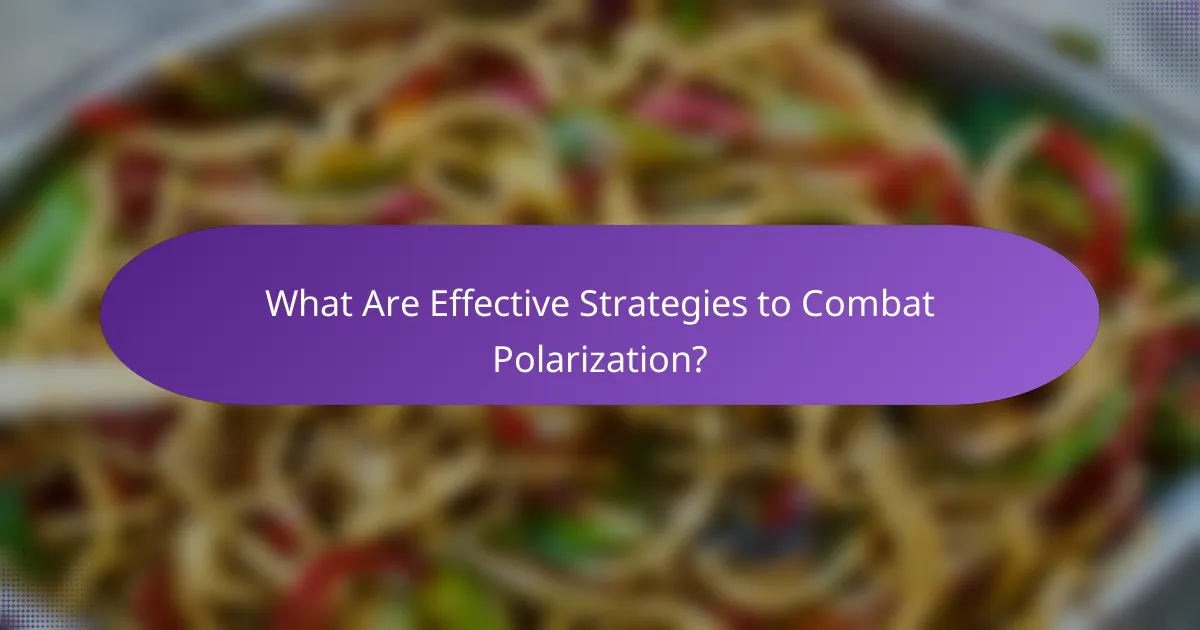
What Are Effective Strategies to Combat Polarization?
Effective strategies to combat polarization focus on fostering communication, collaboration, and support for civil rights. By promoting dialogue, encouraging bipartisanship, and backing civil rights organizations, communities can work towards reducing divisions and enhancing mutual understanding.
Promoting dialogue
Promoting dialogue involves creating spaces where individuals from different political backgrounds can engage in open conversations. This can be achieved through community forums, workshops, or online platforms that encourage respectful exchanges of ideas.
To be effective, dialogue initiatives should prioritize active listening and empathy. Participants should be encouraged to share personal stories and experiences, which can humanize differing viewpoints and foster connection.
Encouraging bipartisanship
Encouraging bipartisanship requires collaboration between political parties to address common issues. This can be facilitated by forming coalitions that focus on shared goals, such as healthcare reform or education improvement, which benefit a broad range of constituents.
Practical steps include organizing joint events or initiatives that highlight successful bipartisan efforts. By showcasing positive outcomes, communities can inspire further cooperation and reduce the perception of an insurmountable divide.
Supporting civil rights organizations
Supporting civil rights organizations is crucial for protecting freedoms and promoting equality. These organizations often work on the front lines to advocate for marginalized groups and challenge discriminatory practices.
Individuals can contribute by volunteering, donating, or participating in awareness campaigns. Engaging with local civil rights groups can also provide valuable insights into the specific challenges faced within a community, fostering a more informed and active citizenry.
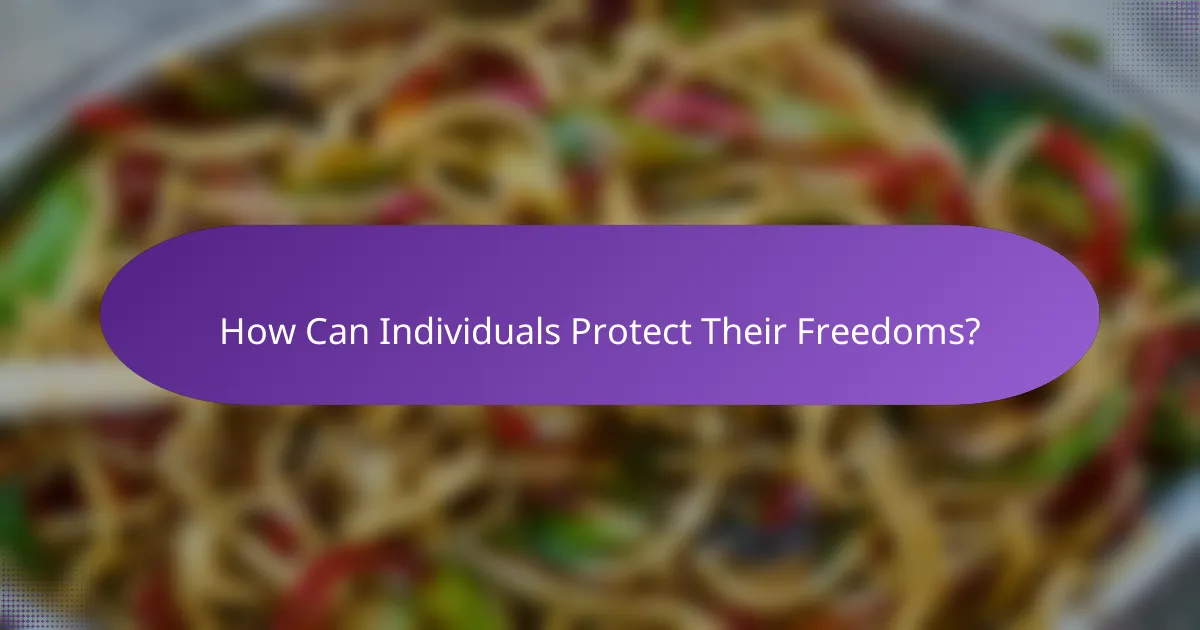
How Can Individuals Protect Their Freedoms?
Individuals can protect their freedoms by actively participating in community efforts, educating themselves and others about their rights, and utilizing available legal resources. Engaging in these activities fosters a culture of awareness and advocacy that can counteract erosions of civil liberties.
Engaging in local activism
Local activism is a powerful way to safeguard freedoms. Individuals can join or form groups that focus on civil rights issues, attend town hall meetings, or participate in peaceful protests. These actions raise awareness and can influence local policies that affect civil liberties.
Consider volunteering for organizations that advocate for civil rights or participate in campaigns that promote voter registration and access. Engaging with local leaders and lawmakers can also amplify your voice and concerns regarding civil rights issues.
Educating others on rights
Education is crucial for protecting freedoms. By informing friends, family, and community members about their civil rights, individuals can create a more informed populace that knows how to advocate for itself. Workshops, seminars, and online resources can be effective tools for spreading knowledge.
Utilize social media platforms to share information about rights and current issues affecting civil liberties. Creating easy-to-understand materials, such as infographics or pamphlets, can help reach a broader audience and encourage discussions about rights and freedoms.
Utilizing legal resources
Accessing legal resources is essential for individuals facing civil rights violations. Familiarize yourself with local legal aid organizations that provide free or low-cost services to those in need. These organizations can offer guidance on how to navigate legal challenges and protect your rights.
Consider consulting with civil rights attorneys who specialize in these matters. They can provide insights into your specific situation and help you understand the legal protections available to you. Knowing your rights and having the right support can make a significant difference in addressing civil rights concerns.

What Role Do Social Media Platforms Play?
Social media platforms significantly influence political polarization by shaping how information is shared and consumed. They can amplify divisive content, enforce content moderation policies, and ultimately sway public opinion, all of which contribute to the erosion of civil rights and freedoms.
Amplifying divisive content
Social media platforms often prioritize engagement, which can lead to the promotion of sensational or polarizing content. Algorithms designed to maximize user interaction may inadvertently favor extreme viewpoints, creating echo chambers that reinforce existing beliefs. This amplification can distort public discourse and increase societal divisions.
For instance, posts that generate high engagement, such as those with strong emotional appeals or controversial opinions, are more likely to be shared widely. This can result in a skewed perception of popular opinion, making extreme views seem more prevalent than they actually are.
Implementing content moderation
Content moderation on social media platforms aims to reduce harmful or misleading information, but it can also lead to accusations of bias. Policies may vary significantly between platforms, with some enforcing stricter guidelines than others. This inconsistency can create confusion and distrust among users.
Moderation practices can include flagging, removing, or limiting the visibility of posts that violate community standards. However, these actions can sometimes suppress legitimate discourse, leading to concerns about censorship and the impact on free speech.
Influencing public opinion
Social media platforms play a crucial role in shaping public opinion by determining which narratives gain traction. The rapid dissemination of information can lead to swift shifts in perception, often based on incomplete or misleading data. This dynamic can exacerbate political polarization as users gravitate toward content that aligns with their beliefs.
Moreover, targeted advertising and algorithm-driven content can create personalized information bubbles, further entrenching users in their viewpoints. Understanding how these mechanisms work is essential for users to critically evaluate the information they encounter and engage in more balanced discussions.
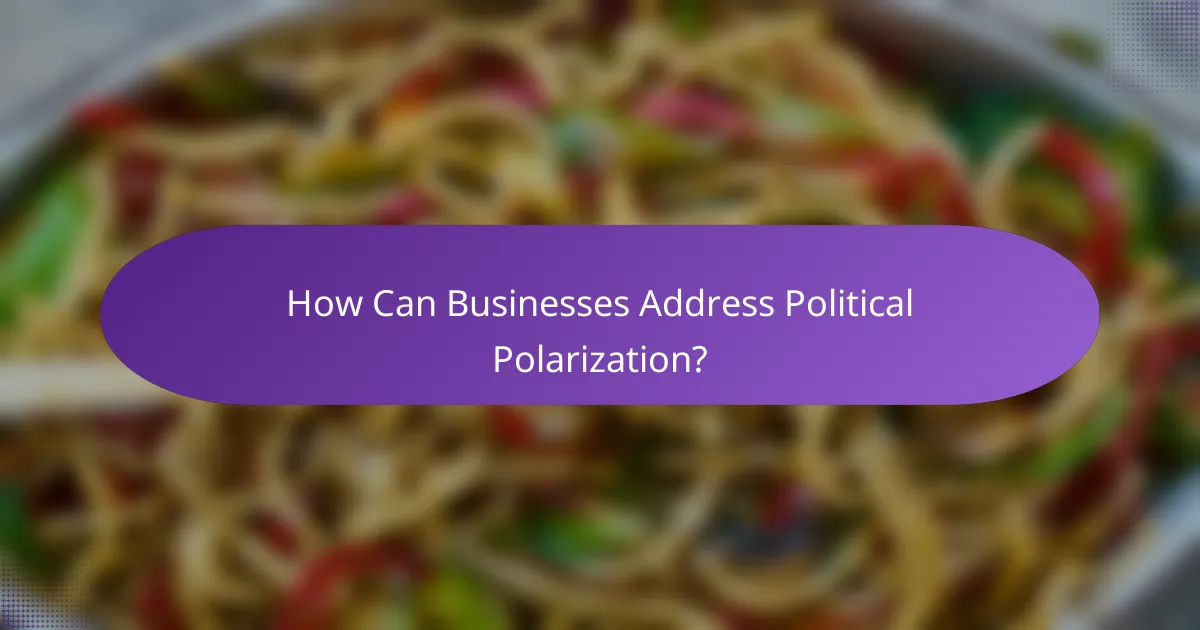
How Can Businesses Address Political Polarization?
Businesses can address political polarization by fostering an environment that promotes inclusivity and open dialogue. This involves creating workplaces that respect diverse viewpoints, supporting community initiatives that bridge divides, and encouraging employee engagement in civic matters.
Creating inclusive workplaces
To create inclusive workplaces, businesses should implement policies that promote respect and understanding among employees with differing political views. This can include training programs focused on diversity and inclusion, as well as clear communication guidelines that discourage divisive rhetoric.
Establishing safe spaces for discussions can also help employees feel comfortable sharing their perspectives. Companies might consider hosting regular forums or workshops where employees can engage in constructive conversations about political issues without fear of backlash.
Supporting community initiatives
Supporting community initiatives is crucial for businesses looking to mitigate political polarization. Companies can partner with local organizations that promote dialogue and understanding among diverse groups. This could involve sponsoring events, funding educational programs, or participating in community service projects.
By actively engaging in community efforts, businesses can demonstrate their commitment to social responsibility and help foster a more cohesive society. This not only enhances the company’s reputation but also builds stronger relationships with customers and stakeholders.
Encouraging employee engagement
Encouraging employee engagement in civic matters can help counteract political polarization. Businesses should provide resources and opportunities for employees to participate in local governance, advocacy, or volunteer work. This could include offering paid time off for voting or community service.
Additionally, facilitating discussions around civic responsibilities and the importance of participation can empower employees to take action. Companies might consider creating internal groups focused on civic engagement, allowing employees to collaborate on initiatives that resonate with their values.
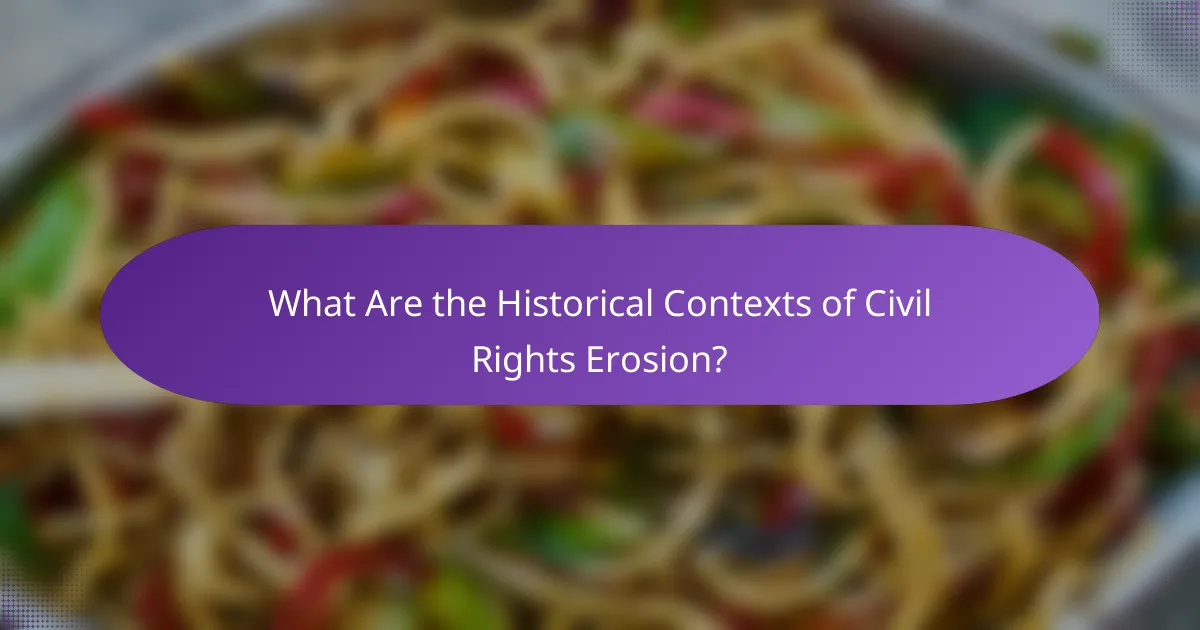
What Are the Historical Contexts of Civil Rights Erosion?
The erosion of civil rights has often occurred during periods of political polarization, where societal divisions lead to legislative and judicial actions that undermine individual freedoms. Historical contexts reveal patterns where fear and conflict have shaped laws and court decisions, impacting the rights of various groups.
Key legislative changes
Throughout history, significant legislative changes have contributed to the erosion of civil rights. For instance, the USA PATRIOT Act, enacted after the September 11 attacks, expanded government surveillance capabilities, often at the expense of privacy rights. Similarly, laws targeting immigration have led to increased scrutiny and restrictions on specific communities.
In many cases, such legislation is justified by national security concerns, but it can disproportionately affect marginalized groups. Understanding these changes is crucial for recognizing how legal frameworks can shift civil liberties.
Major court rulings
Court rulings have played a pivotal role in shaping civil rights, sometimes reinforcing protections and at other times facilitating erosion. Landmark cases like Shelby County v. Holder weakened the Voting Rights Act, allowing states to implement laws that can disenfranchise voters, particularly minorities.
Additionally, decisions regarding free speech and assembly have often favored state interests over individual rights, reflecting a trend where judicial interpretations align with prevailing political sentiments. Awareness of these rulings helps in understanding the legal landscape surrounding civil rights today.
